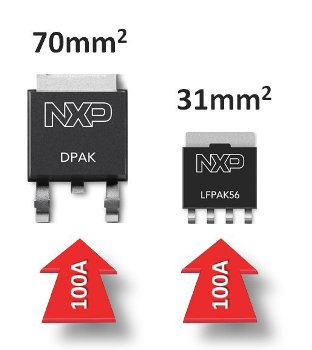NXP Semiconductors N.V. today introduced 54 new automotive-qualified MOSFETs in an LFPAK56 package – the largest portfolio of Power-SO8 MOSFETs available on the market today.
 LFPAK56 MOSFETs
LFPAK56 MOSFETs
Delivering industry-leading performance and reliability, NXP’s LFPAK56 MOSFETs also save more than 55 percent of the footprint area compared to DPAK, significantly reducing overall costs. The LFPAK56 MOSFETs are suitable for a wide range of automotive applications, particularly in the areas of powertrain; body and security; and chassis and safety.
“The mechanical robustness and excellent thermal performance of LFPAK56, combined with its small footprint, make it ideal for high-reliability automotive applications. The proven quality of NXP’s integrated copper clip technology – along with the breadth of our MOSFET portfolio – have made it a popular choice for designers who want to select the power MOSFET with the right parameters for their application,” said Jamie Dyer, international product marketing manager, NXP Semiconductors.
NXP LFPAK56 power MOSFETs are available at voltage grades of 30V, 40V, 60V, 80V and 100V, with excellent RDS(on) performance and current handling across the range. Examples highlighting the range of the portfolio include:
- BUK9Y3R0-40E. With a low RDS(on) of only 3.0 m§Ù at 40V, and the ability to handle currents as high as 100A, this part is ideal for motor drive applications such as those found in seat control, window lifters, windscreen wipers and other body control applications as well as pumps and fans.
- BUK9Y59-60E. With an RDS(on) of 59 m§Ù at 60V, this part is ideal for engine management systems such as gasoline direct injection and diesel direct injection, which typically require multiple parts per system, due to its small size as well as its excellent ruggedness capability.
- BUK9Y38-100E. With an RDS(on) of 38 m§Ù at 100V, this part is ideal for automotive LED applications, due to its ultra-low package inductance and small footprint.
LFPAK56: Copper Clip Advantage
Whereas QFN micro-leads are fully encapsulated, restricting movement which can cause cracks and contamination, the LFPAK gull-wing leads allow for thermal expansion and mechanical strain due to PCB bending and flexing. The integrated copper clip also provides low electrical resistance, low thermal resistance, low inductance, and high reliability. As with other NXP Trench 6 automotive MOSFETs, the new LFPAK56 MOSFETs are fully AEC-Q101 qualified, and have successfully completed extended lifetime testing at 175ºC for more than 1,600 hours – significantly exceeding Q101 requirements – and offer extremely low PPM levels.
Links